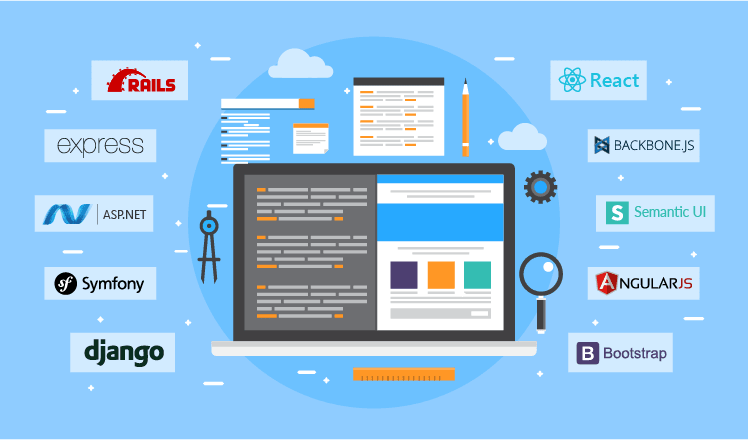In the dynamic landscape of web development, choosing the proper framework is a critical decision that can significantly impact the success of a project. With many options available, developers often grapple with which framework best suits their needs. In this article, we'll compare some popular web development frameworks, highlighting their key features, strengths, and potential use cases.
Angular
Angular, developed and maintained by Google, is a robust and feature-rich front-end framework. It employs TypeScript, a superset of JavaScript, making it a powerful choice for building large-scale and maintainable applications. Some key features of Angular include:
Two-way data binding: Angular's two-way data binding simplifies the synchronization between the model and the view, reducing the need for boilerplate code.
Modularity: Angular encourages a modular structure, making organizing and scaling applications easier. Components, services, and modules facilitate a clean separation of concerns.
Dependency Injection: Angular's dependency injection system promotes the development of loosely coupled and testable code.
Angular suits enterprise-level, single-page applications (SPAs) and projects requiring a highly organized and opinionated framework.
React
Developed and maintained by Facebook, React has gained immense popularity for its flexibility and performance in building user interfaces. React is a library rather than a full-fledged framework, focusing mainly on the view layer. Key features include:
Virtual DOM: React's virtual DOM efficiently updates only the parts of the actual DOM that have changed, leading to improved performance.
Reusable components: React promotes the creation of reusable UI components, facilitating a component-based architecture.
Unidirectional data flow: The one-way data binding in React simplifies the tracking of data changes and enhances predictability.
React is an excellent choice for building modern user interfaces, especially when rapid development and a flexible architecture are essential.
Vue.js
Vue.js is a progressive JavaScript framework that is incrementally adoptable. Developed by Evan You, Vue.js is known for its simplicity and ease of integration. Key features include:
Declarative rendering: Vue.js uses a declarative approach to define the UI, making the code more intuitive and easier to understand.
Component-based architecture: Like React, Vue.js promotes a component-based structure for building scalable and modular applications.
Flexibility: Vue.js can be gradually introduced into existing projects, making it suitable for small-scale projects and more significant applications.
Vue.js is an ideal choice for developers who appreciate a balance between simplicity and functionality, making it an excellent option for startups and projects with varying complexities.
Django
Moving to the server side, Django is a high-level Python web framework that follows the model-view-controller (MVC) architectural pattern. Developed by the Django Software Foundation, Django is known for its emphasis on reusability and rapid development. Key features include:
Object-Relational Mapping (ORM): Django's ORM simplifies database operations by allowing developers to interact with databases using Python code.
Admin interface: Django provides an automatic admin interface, reducing the effort required to manage application data.
Batteries-included philosophy: Django has many built-in features, such as authentication, URL routing, and templating, reducing the need for third-party libraries.
Django is a strong choice for developers working on Python projects, particularly those involving content management systems, e-commerce platforms, or data-driven applications.
Express.js
For those preferring a minimalist and flexible server-side framework for Node.js, Express.js is a popular choice. Express.js simplifies the creation of web applications and APIs, providing a lightweight yet powerful foundation. Key features include:
Middleware support: Express.js allows middleware to handle various aspects of the request-response cycle, such as authentication and logging.
Routing: The routing system in Express.js facilitates the definition of routes for handling different HTTP requests.
Extensibility: Developers can easily integrate additional libraries to extend Express.js functionality according to project requirements.
Express.js is suitable for building scalable and fast server-side applications and APIs, making it a preferred choice for Node.js developers.
Conclusion
Choosing the proper web development framework depends on various factors such as project requirements, development team expertise, and scalability needs. Angular, React, Vue.js, Django, and Express.js have strengths and use cases. Developers should carefully evaluate these frameworks based on their project's needs to ensure a successful and efficient development process. Whether it's a single-page application, a progressive web app, or a data-driven platform, the proper framework can significantly contribute to the success of a web development project.



Top comments (0)